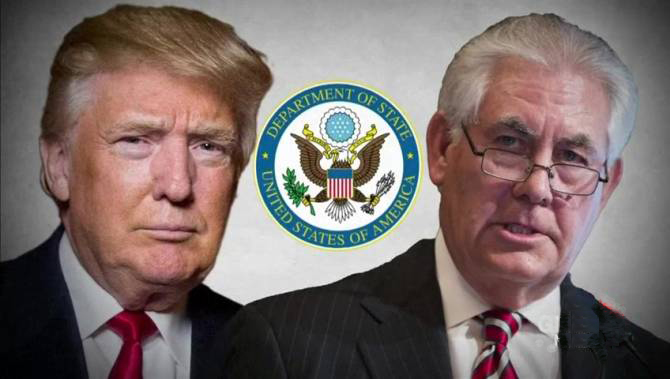Donald Trump ignited controversy last year by nominating Rex Tillerson, then-CEO of Exxon-Mobil, for Secretary of State. Now that Tillerson has been confirmed, observers are waiting to see how the new Secretary accommodates himself to the role. Tillerson is a career businessman, but this does not imply that we have no clues as to how he might behave in the international arena. Indeed, his tenure at Exxon-Mobil included some curious ventures into disputed international waters.

As the Wall Street Journal has noted, Tillerson was previously involved in disputes between China and its neighbors in the South China Sea. Exxon-Mobil signed an oil exploration and production agreement with Vietnam in 2009 while Tillerson was the company’s CEO. Some of the blocks allocated to Exxon lay in waters claimed by both China and Vietnam. In 2014, some of those blocks were the subject of a serious confrontation between China and Vietnam when a Chinese rig began drilling in the disputed area. The decision to operate in such conditions suggests that Tillerson is willing to tolerate an elevated level of risk, as a more cautious CEO might have steered the corporation away from drilling under such potentially risky conditions.
At the same time, Tillerson’s comments during his confirmation hearing suggest an amateurish understanding of the finer points of U.S.-China relations. Tillerson infamously suggested the U.S. prevent China from accessing the disputed South China Sea islands, an action that would undoubtedly be seen as an act of war. The White House and State Department quietly walked those comments back, giving the impression that Tillerson’s statements were not a reflection of new U.S. policy, but rather the dangerous ramblings of an inexperienced nominee. Suffice it to say that the combination of high-risk tolerance and an extremely shallow understanding of Asian geopolitics do not bode well for U.S.-China relations.
Nevertheless, Tillerson will not be the primary figure responsible for U.S. policy towards China. The general trend in recent years has been the increasing centralization of decision-making in the executive branch. The Obama administration was renowned for allowing most cabinet secretaries little room to operate on their own. The Trump administration may very well continue this trend. Tillerson was reportedly not even informed about the extremely controversial immigration ban, although handling its inevitable fallout certainly fell under the purview of the State Department. It is hard to foresee how the internal dynamics and palace politics of the Trump White House will influence China policy at this stage.
It is more important to consider the administration’s interests and general U.S. interests if we want to predict how the U.S. will manage its relationship with China over the next four years. Unfortunately, it seems that the administration will have incentives to provoke a foreign crisis to distract from its domestic failures unless it miraculously improves its approval ratings. (Absent a major terrorist attack, it will not.) China and Iran are the two obvious targets of such a diversionary strategy. This means that, regardless of the U.S.’s long-term strategic interests, domestic politics may cause the administration to behave aggressively towards China.
One could argue that there are important ways in which U.S. interests might diverge from the interests of the Trump administration. If one believes that the U.S. is interested in preventing the hindrance of trade and ensuring peace and stability in the Asia-Pacific, then Trump’s incentives to deal belligerently with China would contradict those interests. The administration’s lack of polish and refusal to abide by basic diplomatic protocol will likely undermine U.S. ideological hegemony in the region. These facts are no doubt deeply troubling to liberal foreign policy professionals at the Brookings Institution.
That said, the atmosphere in Washington has been gradually tilting in favor of confrontation with China for years now. A declining power like the United States has every incentive to confront its rising challenger sooner rather than later, assuming it is unwilling to allow a transfer of power. China’s military capabilities and international influence grow with each passing year. U.S. military planners understand this fact well, and there are few (if any) members of the U.S. foreign policy elite who are willing to give up U.S. hegemony in Asia without a fight.
Trump’s belligerence towards China is not a radical departure from the preceding administration; it is a change in tone, not a change in underlying attitude. The Obama administration did not take such an aggressive position on Taiwan, but it was Obama’s White House that reignited security competition with China after the relatively placid Bush years. We would do well to remember that Trump’s opponent, Hillary Clinton, was one of the preeminent architects of “assertive” U.S. policy in the Asia-Pacific. The ascension of a right-wing buffoon to the presidency did not seem to radically alter the established trend of deteriorating U.S.-China relations.
However, two important things have changed. The first of these factors is perceived legitimacy. Donald Trump’s aggressive, toddler-like demeanor has the potential to aggravate and alienate U.S. allies. There are massive material incentives for many allies to continue cooperating with the United States, but the perception of being bullied and humiliated by Trump will generate domestic pressure to push back against certain U.S. interests. Trump’s recent childish behavior on a diplomatic call with Malcolm Turnbull, Australia’s Prime Minister, seems to have ruffled feathers. Outside the region, European Council President Donald Tusk made headlines by describing Trump’s America as a threat to Europe. These reflect a potential shift in the diplomatic atmosphere that may make it harder for certain leaders to publicly support U.S. policy.
The second factor is the likelihood of a thaw in U.S.-Russian relations. Rex Tillerson, reportedly has a good personal relationship with Vladimir Putin, and he may have an important role in managing U.S.-Russian relations. The U.S. has already eased some sanctions on Russia. Trump has made no secret of his admiration for Putin and willingness to work with Russia in Syria. There will be significant internal pushback on these issues, including from powerful agencies like the CIA. Nevertheless, a U.S.-Russia thaw poses serious risks for China. Simultaneous U.S. belligerence toward Russia and China under the Obama administration pushed both countries closer together, but a U.S.-Russian détente could undermine those ties. Tripolarity is notoriously unstable, and there are obvious incentives for two powers to ally themselves against the third.
The Trump presidency thus presents both risks and opportunities for China. The risks may be quite severe. Trump’s administration may attempt to provoke a diversionary crisis that could do irreparable harm to both the United States and China. Ten years from now, a military confrontation could end U.S. hegemony in Asia. Now, however, China would be drawn into a draining, protracted conflict with little hope of real victory for either side. On the other hand, there are real opportunities for China as well. The Chinese government has the opportunity to play the “adult in the room,” presenting itself as the only stable guardian of regional security. Trump’s demeanor, domestic instability in the U.S., and unnecessary U.S. escalation will all play into this perception. If China can avoid a direct clash with the United States, it may find that the reassessment of its regional role will come sooner than anyone might have imagined.


